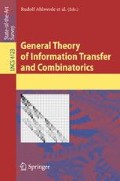Abstract
Grover discovered a quantum algorithm for identifying a target element in an unstructured search universe of N items in approximately \(\pi/4 \sqrt{N}\) queries to a quantum oracle. For classical search using a classical oracle, the search complexity is of order N/2 queries since on average half of the items must be searched. In work preceding Grover’s, Bennett et al. had shown that no quantum algorithm can solve the search problem in fewer than \(O(\sqrt{N})\) queries. Thus, Grover’s algorithm has optimal order of complexity. Here, we present an information-theoretic analysis of Grover’s algorithm and show that the square-root speed-up by Grover’s algorithm is the best possible by any algorithm using the same quantum oracle.
Access this chapter
Tax calculation will be finalised at checkout
Purchases are for personal use only
Preview
Unable to display preview. Download preview PDF.
References
Grover, L.K.: A fast quantum mechanical algorithm for database search. In: Proceedings of the 28th Annual ACM Symposium on the Theory of Computing (STOC), pp. 212–219 (1996)
Grover, L.K.: Quantum mechanics helps in searching for a needle in a haystack. Phys. Rev. Letters 78(2), 325–328 (1997)
Zalka, C.: Grover’s quantum searching is optimal. Phys. Rev. A 60, 2746 (1999)
Bennett, C.H., Bernstein, E., Brassard, G., Vazirani, U.V.: Strength and weaknesses of quantum computing. SIAM Journal on Computing 26(5), 1510–1523 (1997)
Boyer, M., Brassard, G., Hoeyer, P., Tapp, A.: Tight bounds on quantum computing. In: Proceedings 4th Workshop on Physics and Computation, pp. 36–43 (1996); Fortsch. Phys. 46, 493–506 (1998)
Nielsen, M.A., Chuang, I.L.: Quantum Computation and Quantum Information. Cambridge University Press, Cambridge (2000)
Stoer, J., Bulirsch, R.: Introduction to Numerical Analysis. Springer, NY (1980)
Editor information
Editors and Affiliations
Rights and permissions
Copyright information
© 2006 Springer-Verlag Berlin Heidelberg
About this chapter
Cite this chapter
Arikan, E. (2006). An Upper Bound on the Rate of Information Transfer by Grover’s Oracle. In: Ahlswede, R., et al. General Theory of Information Transfer and Combinatorics. Lecture Notes in Computer Science, vol 4123. Springer, Berlin, Heidelberg. https://doi.org/10.1007/11889342_25
Download citation
DOI: https://doi.org/10.1007/11889342_25
Publisher Name: Springer, Berlin, Heidelberg
Print ISBN: 978-3-540-46244-6
Online ISBN: 978-3-540-46245-3
eBook Packages: Computer ScienceComputer Science (R0)

